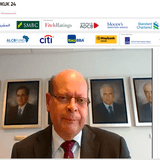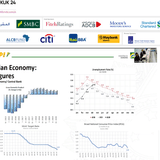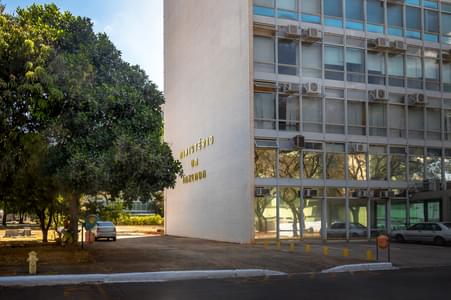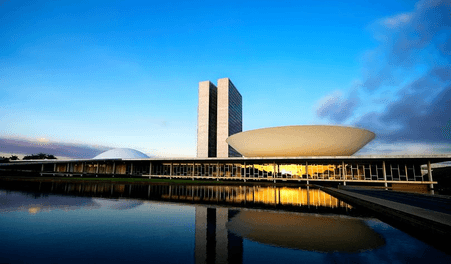In a sign of fading optimism, the real has dropped 4.9% in March, while the Ibovespa stock exchange is down 7% from recent highs. According to a survey of 122 institutional investors published by XP Investimentos earlier this month, equities could fall by roughly another 20% if the pension reform stalls. An opinion poll published last week showed a 16% drop in support for Bolsonaro’s style of government.
Following years of recession, corruption scandals and political turmoil, the mere thought of economic reforms and the government faltering triggers panic among business leaders.
"If we don’t get this pension bill approved, there will be no investment, Brazil will go bankrupt, unemployment will return," said Luciano Hang, owner of the Havan department store chain. "The people won’t be fooled by politics."
Much to the chagrin of investors who believe in Bolsonaro’s market-friendly Economy Minister Paulo Guedes, many of the government’s problems stem not from the opposition but from within its own ranks.
Cabinet members openly vie for power; far-right ideologues clash with moderates and the president himself acts as if he were still campaigning, rallying his support base and riling the opposition with provocative tweets and videos.
One source of friction are Bolsonaro’s sons, who propose policies, nominate staff, and publicly spar with cabinet members, despite having no official role in government. Carlos, who is the second of four sons and ran his father’s social media campaign, has placed several "confidants" inside the president’s press office to keep an eye on the media coverage.
Their presence led the press secretary to resign this month, according to an official with direct knowledge of his decision.
It was also a critical tweet from Carlos that irked Lower House President Rodrigo Maia, prompting him to tell TV Globo late last week that the president "needs to spend more time on the pension reform and less on Twitter." As things stand, the bill would not pass, Maia said.
Some of Bolsonaro’s supporters say it’s a new way of doing politics, but critics argue it’s a lack of leadership, and that politicians of any stripe must still negotiate to get things done.
New Politics
"What Bolsonaro needs to do is step down from the campaign stump, he needs to show who is in charge, at home and in government," said Simone Tebet, head of the Senate’s Justice and Constitution Committee.
To be sure, some investors are discounting the turbulence of the government’s first few months and remain optimistic that the president can deliver. Most believe that a pension bill will still be passed, albeit later and more watered down than previously expected.
“We were anticipating volatility in the negotiation process,” said Shamaila Khan, director of emerging-market debt at AllianceBernstein. “The reform process will be supported by public opinion and Bolsonaro’s still high approval ratings.”
For the president’s support base, the case against him is largely a media fabrication. The press is a regular target of Bolsonaro’s ire.
“Our president is suffering because of the media, but I still trust him," said Sibelli Marcolina, a lawyer from the southern state of Parana.
Since Carlos Bolsonaro and his Justice Minister Sergio Moro publicly clashed last week with Maia, administration officials have tried to calm tensions and reassure investors. Moro said the standoff had been overcome, and Vice President Hamilton Mourao has been calling for increased dialogue among cabinet members.
"The key points are clarity in our objectives, determination to achieve them and patience to have the best dialogue," the retired Army General told Bloomberg News via text message.
Yet it is not the first time the government has promised more cohesion and harmony. In fact, last Tuesday did little to convince sceptics.
Investors were aghast when Guedes cancelled a hearing on the pension reform where he risked being grilled by the opposition. At the same time, Bolsonaro went on an unscheduled escapade with his wife to the movies. Upset congressional leaders then imposed one of the biggest defeats on any government by voting for new budget restrictions.
Editorials in all three of the country’s leading newspapers blasted Bolsonaro for the recent political turmoil and questioned his ability to carry out his presidential duties.
"What he’s shown so far is that we’ll have 3 years and 9 months of more turbulence," said Traumann, who advised former Finance Minister Henrique Meirelles.
Bolsonaro’s press office did not respond to requests for comment on this story.
Brazil's Economic Growth
The end of last year’s frenzied election is expected to make way for improved economic sentiment over the short-term and, along with continued employment gains and accommodative monetary policy, should kick the recovery into a higher gear. In addition, the U.S. Federal Reserve’s dovish turn should bode well for the outlook. Implementation of sorely-needed economic reforms remains pivotal. FocusEconomics analysts put growth at 2.3% this year, which is down 0.1% from last month’s forecast, and at 2.5% next year.
Brazil’s lacklustre fourth quarter capped off a second, unenthusiastic year of economic recovery. Plunging inventories and weaker fixed investment caused growth to slow in Q4, while consumption was uneven. Public spending fell while private spending largely held up.
Available indicators for the first quarter of 2019, meanwhile, have been patchy, revealing little positive carryover from last year’s stumble: Improved economic sentiment through February bodes well for domestic demand in the first quarter, but exports swung to contraction in February.
Pension Reform: Will It Pass?
Taking aim at the government’s strained finances, newly-elected President Jair Bolsonaro presented Congress with a comprehensive social-security reform bill on 20 February. His plans set out to save more than BRL1tn over the next 10 years—about BRL300bn more than former President Michel Temer’s failed reform package—while clawing back several public-pension benefits and introducing, among other provisions, a minimum retirement age.
Financial markets reacted positively to Bolsonaro’s bold and ambitious proposals, highlighting that savings of this scale could help stabilize the public debt ratio. Congressional approval remains far from certain, however, and most analysts expect any successful legislation to get heavily watered down.
Assessing the merits of the proposal, Gustavo Rangel, chief economist at ING, points out that, “the guiding principle of the reform is to delay retirement by introducing stricter criteria, including a minimum age of 62 for women and 65 for men, and higher minimum years of contribution into the system. Retirement rules for special regimes for teachers, police, rural workers, and the elderly poor would also become stricter.”
The implied savings, meanwhile, would amount to “2.7% of GDP by 2027 (or BRL1.1tn accumulated over 10 years)”, according to André Matcin, an analyst at Itaú BBA.
As highlighted by William Jackson, chief economist at Capital Economics, passing the legislation will be tricky.
“The proposal only marks the starting point for negotiations in the legislature. Comments from the government suggest it is 60 to 70 seats short of the 308 votes needed in Congress to approve the reform.” Jackson noted that “the Temer reform had an approval rating of just 20% or so.”
Brazil’s fragmented Congress means that the government’s plans will almost certainly be watered down. Still, analysts remain upbeat - Helcio Takeda, an analyst at Pezco Economics is one of them:
“We recognize that the original project will not be approved as it is. From the estimated saving of BRL1.1tn in 10 years, we expect the approved reform to save around BRL700bn in 10 years. Although it is 36% lower than the original estimate, we think it is still a sizeable amount. At least, a reform that could [deliver] BRL500bn [in savings] in 10 years is welcome.”
New COPOM Monetary Policy Unchanged
At its 19–20 March meeting, the Central Bank of Brazil’s Monetary Policy Committee (Comité de Política Monetária, COPOM) unanimously decided to hold the benchmark SELIC interest rate at its record low of 6.50%, where it has rested since the Central Bank paused its long and aggressive easing cycle in March 2018. The decision matched market analysts’ expectations. The meeting marked the first Central Bank decision by the new COPOM board, including new Governor Roberto Oliveira Campos Neto.
The Bank’s decision comes amid below-target inflation in Brazil’s economy, along with a slow economic recovery. A rally in the real in the fourth quarter and economic slack have helped keep price pressures in check, allowing for the Bank to keep rates at a low level to support growth. The new COPOM left the inflation forecast for 2019 unchanged from the previous meeting and sees price growth rate ending the year at 3.9%, in a scenario with interest and exchange rates determined by the market. However, the statement did acknowledge that economic activity has been weaker than expected.
Looking forward, the Bank struck a wait-and-see view stressing “caution, serenity and perseverance in monetary policy decisions”. It also downgraded its view of inflationary pressures stating that risks to inflation are broadly balanced, contrasting the previous communique’s upwards tilt. The more dovish tone of the Federal Reserve and moderate economic activity have helped cool inflationary risks and our panel sees rates on hold in the near-term.
Summarizing Nomura’s view of the meeting, Joao Pedro Ribeiro explained:
“We see today’s decision and communique as in line with our view of unchanged rates this year. We see this particularly likely in the near term, which is still marked by high uncertainty on the prospects and timing of social security reform in Congress. In this sense, while the new board acknowledged a scenario marked by weaker growth (albeit still on a gradual recovery path) and less inflationary risks, it also offered no desire to move policy anytime soon, seemingly setting the stage for a longer period of data (and reform) observation before it sends clearer signals as to the direction of policy. We continue to see risks to our policy rate forecasts as tilted to the downside on weaker-than-expected growth.”
Public Debt, Deficit and other Indicators
Consensus currently sees the public debt at 79.3% of GDP this year before rising steadily to 83.3% of GDP. The current account deficit widened in January, coming in at a -USD6.5bn in January, a slightly higher shortfall than the USD6.3bn deficit recorded in the same month of 2018.
The deterioration was due chiefly to a lower trade surplus, which came in at USD2.2bn in January (January 2018: USD2.8bn). Meanwhile, foreign direct investment fell to USD5.9bn in January, below the USD8.4bn recorded in the same month of the previous year.
The 12-month trailing current account deficit hit USD14.8bn in January, larger than December’s USD14.5bn shortfall. January’s result is equal to approximately 0.8% of GDP.
Analysts who participated in this month’s LatinFocus Consensus Forecast expect a current account deficit of 1.3% of GDP in 2019. For 2020, panellists expect the current account deficit to widen to 1.6% of GDP.








